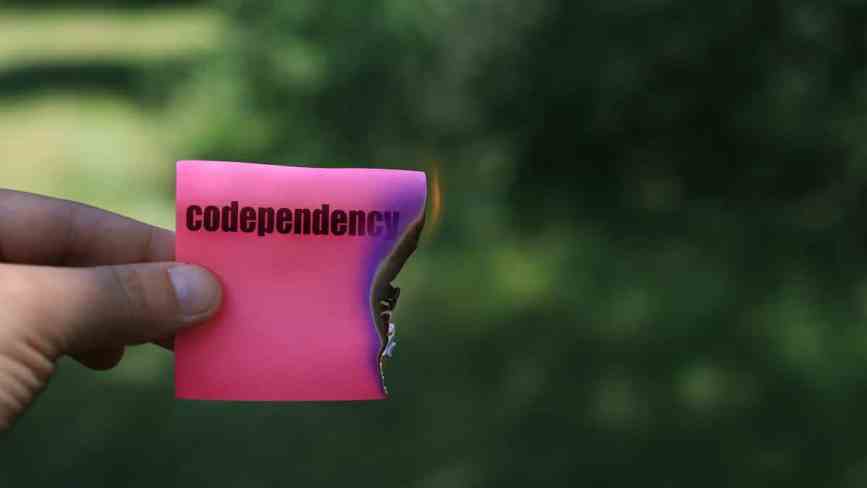- The Sober Sip powered by The Sober Curator
- Posts
- Co-Dependency Made Me Co-Crazy by Dr. Sarah Michaud
Co-Dependency Made Me Co-Crazy by Dr. Sarah Michaud

“Dismissing our needs, feelings, and thoughts leads us to behaviors that we use to numb out the pain of not being seen. Your needs, ideas, and emotions are all essential. Don’t dismiss yourself because it will lead others to do the same. It will also lead to accumulated repressed anger, grief, and fear that eventually will come out against yourself and others.”
I ended up in a treatment facility the summer between my first and second year in a doctorate program. It wasn’t due to a relapse. It was because I couldn’t stop certain behaviors. I felt lost, confused, angry, detached, and resigned. I thought that I might never understand the reason for my continuous train of unsuccessful relationships.
On the first day, I was in a group on relationship dynamics within families with addiction/dysfunction, and the leader wrote on the whiteboard:
Addicts: 95% pain and problems, 5% Addiction
Co-Addicts: 100% Pain and Problems
Growing up in a household with addiction, abuse, mental illness, or any other situation where your parents don’t address their own feelings or experiences creates a person who keeps working out unhealthy patterns repetitively in their relationships to try to gain mastery over these old wounds. We are all trying to recover from our childhoods in one form or another. We try to heal from this brokenness through our relentless preoccupation with healing others rather than keeping the focus on ourselves. This is what I call “Co-Crazy”. You feel crazy in a relationship. Trying to fix, change or save another while your emotional world decompensates.
Defining Co-Crazy
If we have an addiction, love someone with an addiction, or are driven by an unconscious drive for approval or love, we most likely are Co-Crazy. We may use a particular thing to escape or utilize other defenses to cope with our past pain and present struggles. We may not all suffer the severe consequences of addiction, but we have all felt hurt, upset, angry, lost, ashamed, betrayed, fearful or alone. The human condition is about learning to navigate this world in a way that works without getting lost in the old patterns of relating that lead to chronic frustration and repetitive loss.
In working with people in recovery for over 30 years, the final analysis was that underneath most people’s addiction was untreated codependency. I’ve often said that if my clients learned how to do two things, I would not have a job: Set Boundaries and Speak Up. Moreover, I experienced firsthand the insanity of these behaviors when my husband relapsed after 15 years of recovery. I became sicker and sicker while he was popping Percocets and Ativan. My mental health collapsed.

Co-Dependency is not just for addicts
This can happen whether you are a spouse, a parent, a co-worker, an adult child, or a friend. Many people can be codependent even when addiction is not involved. It’s a way we dismiss ourselves, sometimes obviously, sometimes subtly. Codependency happens on a continuum. Some parents may have remortgaged their house twice to pay for their son’s treatment. At the other end may be a new mother who is fearfully trying to manage all her anxiety by becoming controlling with their child.
The first quote I wrote about dismissing our needs truly describes what happens when we begin to take the focus off ourselves and onto others. It doesn’t work because we lose the connection to our true selves, and the more we continue to detach from our own experiences and feelings, the more we abandoned ourselves, which can lead to severe consequences: depression, anxiety, other addictions, acting out, rage, affairs, a relapse…the list is endless.
Tips of the Week for Healing Your Own Co-Crazy is This:
Notice during your day-to-day interactions that you dismiss yourself by minimizing how you feel and saying, “It doesn’t matter.”
Consider what makes it so difficult to acknowledge that your needs are important.

For more support with your Co-Crazy Recovery Journey, check out the book: Co-Crazy – One Psychologist’s Recovery from Codependency and Addiction.
Also, subscribe to the YouTube Channel Leaving Crazy Town with Finn and Sarah @LeavingCrazyTown or check out Sarah’s website at DrSarahMichaud.com

LEAVING CRAZY TOWN: Welcome to Leaving Crazy Town, a YouTube channel created by Dr. Sarah Michaud and Finn Allen dedicated to helping individuals navigate the ups and downs of life, including the struggle with codependency.

SOBERSCRIBE & BE ENTERED TO WIN!
Resources are available
If you or someone you know is experiencing difficulties surrounding alcoholism, addiction, or mental illness, please reach out and ask for help. People everywhere can and want to help; you just have to know where to look. And continue to look until you find what works for you. Click here for a list of regional and national resources.
The post Co-Dependency Made Me Co-Crazy by Dr. Sarah Michaud appeared first on The Sober Curator.
Reply